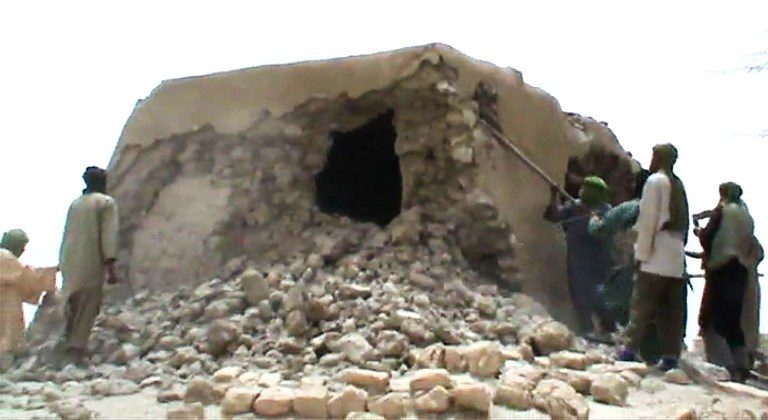SUMMARY
This is AI generated summarization, which may have errors. For context, always refer to the full article.

THE HAGUE, Netherlands (UPDATED) – Prosecutors at the International Criminal Court on Tuesday, March 1, accused a Malian jihadist of war crimes for “a callous” 2012 attack on the centuries-old world heritage site of Timbuktu.
“We must stand up to the destruction and defacing of our common heritage,” said chief ICC prosecutor Fatou Bensouda as she unveiled a single war crimes charge against Ahmad al-Faqi al-Mahdi.
“Humanity’s collective consciousness was shocked by the destruction of these sites. Such an attack must not go unpunished,” she insisted at the tribunal, set up in 2002 to try the world’s worst crimes.
Faqi is the first jihadist to appear before the Hague-based ICC and the first person to face a single war crimes charge for an attack on a global historic and cultural monument.
The case comes amid a global outcry over the razing by the so-called Islamic State group of other irreplacable cultural and religious sites in Iraq and Syria which bear testament to the world’s collective history.
A member of an Islamic court set up by the Malian jihadists to enforce strict sharia law, Faqi is said to have jointly ordered or carried out the destruction of 9 mausoleums and Timbuktu’s famous Sidi Yahia mosque, dating back to the 15th and 16th centuries.
Bensouda called the attacks a “callous assault on the dignity of an entire population and their cultural identity.”
Founded between the 11th and 12th centuries by Tuareg tribes, Timbuktu was dubbed “the city of 333 saints” and added to the list of UNESCO world heritage sites in 1988.
Despite having been a center of Islamic learning during its golden age in the 15th and 16th centuries, it was considered idolatrous by the jihadists.
ICC prosecutors say Faqi was a leader of Ansar Dine, a mainly Tuareg group, which held sway over Mali’s northern desert together with Al-Qaeda in the Islamic Maghreb (AQIM) and a third local group from early 2012 until being routed in a French-led intervention in January 2013.
‘Contempt for history’
Dressed in a simple collarless white shirt and his mass of curly black hair held back by headphones, Faqi listened intently, occasionally raising an eyebrow, as Bensouda accused him and his co-perpetrators of showing “their contempt” for Timbuktu’s earthen shrines.
“I’ve understood the charge well,” Faqi told presiding judge Joyce Aluoch, speaking in Arabic.
In what is an unprecedented case, Faqi is also the first person to appear at the ICC on charges arising out of the violence which rocked the western African nation of Mali, where stretches of the remote north still remain out of government control.
Prosecutors are seeking to persuade the 3 judges that there is enough evidence to proceed to a trial with Faqi in the dock.
“Let us be clear. What is at stake here is not just walls and stones. The destroyed mausoleums were important from a religious point of view, from a historical point of view, and from an identity point of view,” said Bensouda.
Faqi was arrested in Niger and transferred to the ICC in September 2015.
A trial will “set a precedent for trying individuals for this crime at a time when attacks on historic and cultural monuments as well as other cultural crimes have gained prevalence and attention in Syria and elsewhere,” said Jonathan Birchall, a spokesman for the NGO Open Society.
Despite the significance of the case, some rights groups however have called for the charges against Faqi to be broadened notably to include rape and sexual slavery.
“Given his role in the Islamic police and the ‘manners (anti-vice) squad’ in Timbuktu he should face charges for other international crimes, such as sexual violence,” said the International Federation for Human Rights (FIDH).
UNESCO has meanwhile restored the 14 mausoleums that were destroyed in Timbuktu, which is about 1,000 kilometers (600 miles) from the capital, Bamako. – Jo Biddle and Jan Hennop, AFP / Rappler.com
Add a comment
How does this make you feel?
There are no comments yet. Add your comment to start the conversation.